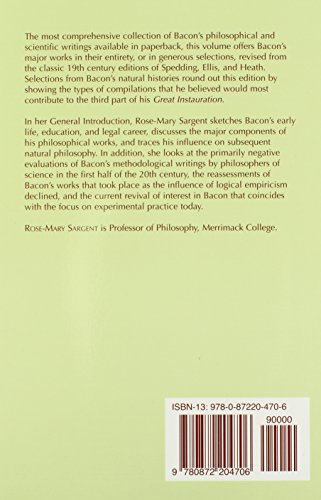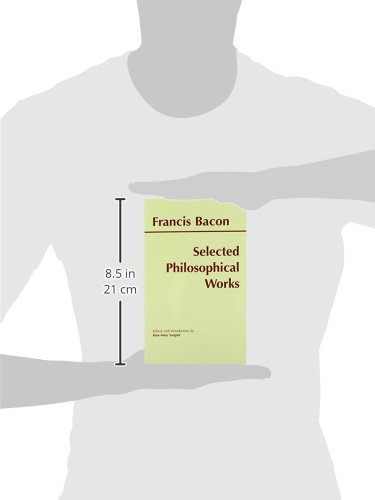Customer Services
Copyright © 2025 Desertcart Holdings Limited
Desert Online General Trading LLC
Dubai, United Arab Emirates




Selected Philosophical Works (Bacon) (Hackett Publishing Co.)
M**N
A reasonably priced source for some of the most important prose written in the modern era
I'm not one of those who believes that Francis Bacon was the real author of Shakespeare's 40 or so theatrical masterpieces. This strikes me as highly unlikely given Bacon's own masterful philosophical writings, which are works of genius that have provided Bacon with his own strong claim for immortality without the Bard's assistance. Included in this comprehensive collection are the complete Great Instauration, The New Organon and Preparative, the complete unfinished (at his death) New Atlantis, the complete Book One of the Advancement of Learning and very substantial selections from Bacon's Natural History.The collection is extensive and well-chosen by editor Rose-Mary Sargent. Particularly impressive is her informative 35 page general introduction, which discusses Bacon's life and his professional career, the nature of his various works and their influence, and Bacon's brilliant methodological dictates in the New Organon in which he discusses the four "idols" or "false notions" of the human mind that hinder the pursuit of truth. Bacon was engaged in nothing less than a frontal assault upon Aristotle's physics, metaphysics, logic and natural history and Europe's subsequent deeply entrenched formal academic Aristotelian Scholasticism, the combination of which had structured human thought and pursuit of learning for nearly 2,000 years. Bacon wanted to create the structural ground necessary for true collaborative scientific effort and discovery and that is precisely what he did. Modern science as a discipline has its birth in Bacon's philosophical writings, which were seminal in producing a broad reform in learning across Europe that influenced thinkers like Descartes, Galileo, Harvey and the young English chemist Robert Boyle. The eventual creation of the Royal Society, with its epochal influence upon the growth to maturity of natural philosophy (what we now call science), was a direct attempt to crystallize Bacon's theoretical precepts into real world public policy. One of the "giants" upon whose shoulders Isaac Newton had stood was Francis Bacon. Newton respected few men for their intellectual achievements but Bacon was someone for whom (along with Galileo and Kepler) he reserved a special regard. Read Voltaire's Letters Concerning the English Nation (1733), and the essay on Francis Bacon for an illuminating comparison and appreciation of the two men.Bacon's writing is unusually sophisticated, complete with a masterful use of memorable metaphors that are still used today for their concision and accuracy. This excellent edition also includes an extensive bibliography organized by source catagories, introductory notes for each included work and a solid index. All of modern science and its use of induction (from particular datum to general hypothesis and theory) has its roots here, in the brilliance of Francis Bacon's philosophical works. This volume from Hackett is a reasonably priced source for some of the most important prose written in the modern era.
G**N
Get highlights of a key philosopher
Book provides excellent overview of Bacon’s body of work and includes the most relevant selections of his philosophical program
Trustpilot
3 weeks ago
2 weeks ago